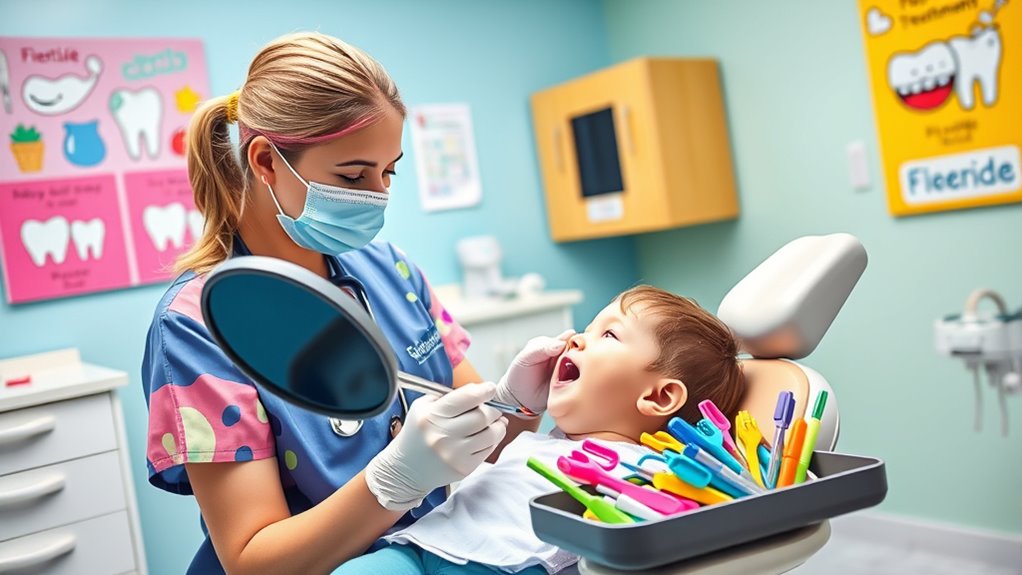Starting your child’s dental visits early helps set healthy habits, making future visits less stressful. Regular checkups let your dentist monitor development, spot issues early, and give tailored advice. Fluoride treatments, when used properly, strengthen teeth and prevent cavities safely. Your dentist will evaluate fluoride needs based on your child’s age and risk factors. For more tips on ensuring a positive dental experience and safe fluoride use, keep exploring how these strategies protect your child’s smile.
Key Takeaways
- Early dental visits establish healthy habits and reduce dental anxiety for children.
- Routine checkups allow for early detection of dental issues and personalized guidance.
- Fluoride is safe when used correctly; it strengthens enamel and prevents cavities.
- Dentists assess fluoride needs based on age, risk factors, and overall health.
- Regular visits and proper fluoride use promote long-term oral health and development.

Have you ever wondered why regular dental visits are so important for your child’s oral health? Starting early with dental checkups helps establish healthy habits that last a lifetime. When you take your child to the dentist early on, you’re not just addressing dental issues—you’re setting the foundation for good oral hygiene. Early dental habits, like brushing twice a day and flossing, become ingrained when reinforced by a dental professional. These visits also allow your child’s dentist to monitor their development, identify potential problems early, and provide guidance tailored to their needs. The sooner you introduce your child to the dental office, the more comfortable they’ll feel during future visits, reducing anxiety and promoting positive attitudes toward dental care.
It’s natural to have concerns about fluoride safety, especially when it comes to your child. Rest assured, fluoride is a safe and effective tool in cavity prevention when used correctly. During regular dental visits, your child’s dentist will apply fluoride treatments if deemed appropriate, which helps strengthen the enamel and makes teeth more resistant to decay. The key is moderation; fluoride is safe in the small amounts used in professional treatments and toothpaste, but too much can be harmful. That’s why dentists carefully evaluate your child’s age, risk factors, and overall oral health before recommending fluoride applications. They also educate parents about the importance of fluoride-containing products, ensuring that your child benefits from its protective effects without any risk of overexposure.
Understanding fluoride safety involves knowing that the benefits outweigh the risks when used properly. The main goal is to prevent cavities, which are a common concern in children, especially as they learn to brush and eat more independently. Regular dental visits provide a chance for your child’s dentist to assess their fluoride intake from various sources and offer personalized advice. For example, they may recommend a specific toothpaste with the right fluoride concentration or suggest a fluoride varnish application during visits. These preventive measures are proven to reduce the likelihood of cavities and promote stronger, healthier teeth.
Additionally, staying informed about preventive dental care can help you make better choices to protect your child’s oral health.

Crest Kid's Cavity Protection Toothpaste, Crest Kids Toothpaste, For Children And Toddlers 2+, Sparkle Fun, 4.6 Oz (Pack of 3), Toothpaste For Kids, Packaging may vary
CAVITY FIGHTER: Crest kids toothpaste fights cavities with clinically proven Fluoristat, making it a reliable choice for kids…
As an affiliate, we earn on qualifying purchases.
As an affiliate, we earn on qualifying purchases.
Frequently Asked Questions
When Should My Child First See a Pediatric Dentist?
You should take your child to a pediatric dentist by their first birthday or when you notice teething milestones, whichever comes first. Early visits help establish good dental hygiene routines and allow the dentist to monitor their development. Regular checkups ensure proper care as your child’s teeth grow. Starting early also helps your child become comfortable with dental visits, making future appointments easier and fostering a lifetime of healthy smiles.
How Can I Prepare My Child for Their First Dental Visit?
You can prepare your child for their first dental visit by talking about tooth eruption and making it sound exciting. Use simple words to explain that the dentist will help keep their teeth healthy. Practice good dental habits at home, like gentle brushing, to build confidence. Bring a favorite toy or blanket, stay positive, and reassure them it’s a friendly visit. This helps ease nerves and sets a positive tone.
Are Fluoride Treatments Safe for Very Young Children?
Fluoride treatments are generally safe for very young children when administered properly. The key is understanding fluoride safety and ensuring the right amount of early fluoride is used. Your child’s pediatric dentist will apply the fluoride carefully to prevent ingestion and monitor its use during early fluoride treatments. With proper supervision, fluoride helps strengthen teeth, reduce cavities, and supports your child’s oral health from a young age.
How Often Should My Child’s Teeth Be Checked for Cavities?
Think of your child’s teeth as a garden needing regular tending. You should have their teeth checked every six months to catch cavities early. During visits, the dentist may suggest dental sealants to shield against decay and discuss reducing sugar intake, which fuels cavity monsters. Consistent checkups help keep the garden healthy, ensuring bright smiles flourish and preventing small issues from turning into big problems.
What Are the Signs of Dental Anxiety in Young Children?
You might notice your child clinging to you, crying, or resisting when it’s time for a dental visit—signs of dental anxiety. Using behavior management and calming techniques, like gentle reassurance, distraction, or deep breathing exercises, can help ease their fears. Watch for signs like clenched fists, trembling, or avoiding eye contact. Addressing these early encourages positive experiences and helps your child feel safe during dental care.

Dentist Play Set for Kids Ages 3-8, 26PCS Realistic Pretend Dental Toy Kit with Teeth Cleaning Tools, Doctor Costume & Learning Guide. STEM Educational Toys, Toddler Medical Kit for Boys & Girls Gifts
𝐅𝐔𝐋𝐋 𝐃𝐎𝐂𝐓𝐎𝐑 𝐄𝐗𝐏𝐄𝐑𝐈𝐄𝐍𝐂𝐄-Includes adjustable kid-sized lab coat,dental models, retainer, dental braces, tooth decay stickers etc. for immersive pretend…
As an affiliate, we earn on qualifying purchases.
As an affiliate, we earn on qualifying purchases.
Conclusion
So, next time your little one’s first dental visit rolls around, remember: ignoring fluoride and skipping regular check-ups might save a few bucks now, but could cost a lot more later. Who needs healthy teeth when you can gamble on cavities and toothaches? Just don’t come crying when your kid’s smile isn’t quite so “picture perfect.” After all, isn’t risking a lifetime of dental drama worth a few skipped appointments and fluoride?

3M 70201400762 Just For Kids 0.4% Stannous Fluoride Brush On Gel, Extra Cavity Protection, 4.3 oz
EXTRA CAVITY PROTECTION for kids who have a history of cavities, as well as those living in areas…
As an affiliate, we earn on qualifying purchases.
As an affiliate, we earn on qualifying purchases.

GuruNanda Kids Butter On Gums Cute Giraffe Toothbrush with Tongue Scraper & Cover – Super Soft Bristles for Gentle Cleaning -Ergonomic Handle (Age 1+)
SUPER SOFT BRISTLES FOR GENTLE GUM CARE – Transform teeth cleaning into a gentle & enjoyable adventure for…
As an affiliate, we earn on qualifying purchases.
As an affiliate, we earn on qualifying purchases.









